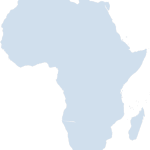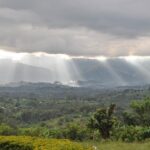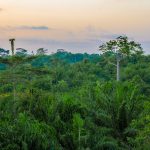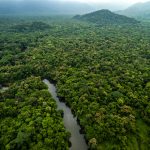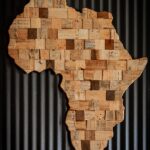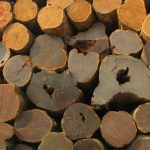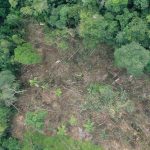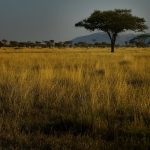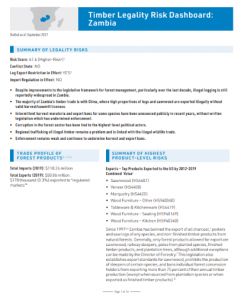
- Despite improvements to the legislative framework for forest management, particularly over the last decade, illegal logging is still reportedly widespread in Zambia.
- The majority of Zambia’s timber trade is with China, where high proportions of logs and sawnwood are exported illegally without valid harvest/sawmill licenses.
- Intermittent harvest moratoria and export bans for some species have been announced publicly in recent years, without written legislation which has undermined enforcement.
- Corruption in the forest sector has been tied to the highest-level political actors.
- Regional trafficking of illegal timber remains a problem and is linked with the illegal wildlife trade.
- Enforcement remains weak and continues to undermine harvest and export bans.
Read more by downloading the Zambia Timber Legality Risk Dashboard here.
A ZAM transnational investigation conducted across six African countries has revealed the complicity of governing political elites in rapid deforestation. At the same time, many of these elites are receiving billions of dollars and euros in ‘green’ funds from international partners, including the UN, the EU, and the World Bank. Previous instalments of this investigation, already published by ZAM, have highlighted this pattern in Uganda, Nigeria, and Mozambique. The latest findings from Cameroon, Ghana, and Malawi are in line with the earlier results.
A multinational law enforcement operation codenamed ‘Operation Jungle Shield’, coordinated by the International Initiative of Law Enforcement for Climate (I2LEC), has uncovered extensive environmental crimes across the Congo Basin. The operation hit at organized crime groups, seizing 2,111kg of ivory and 34 kg of pangolin scales, rescuing a live pangolin from trafficking, and confiscating 180 pieces of equipment used for criminal activities. 58 suspects were arrested and charged with various environmental crimes. The total value of seizures is estimated at US$11,227,857. Additionally, the operation identified illegal logging and charcoal production activities, which are estimated to have resulted in 213,227 tons of CO2 emissions.
Many of the illegal activities uncovered were found to be destined for Asian markets.
Kleptocrats on the continent are profiting from the illicit forestry trade, which is estimated by Interpol and the United Nations Environment Programme to be worth $51 billion to $152 billion annually. Short summaries of the issue provided for DRC, Mozambique, Zambia, Equatorial Guinea, Namibia, Zimbabwe, Gabon, Tanzania, Kenya.
The Team Europe Initiative (TEI) supports capacity building and provides technical support on traceability
systems, geolocalisation and legality to partner countries, through a specialized Technical Facility and
programmes such as SAFE and AL-INVEST Verde. TEI programmes are active in Brazil, Colombia, Democratic
Republic of the Congo, Ecuador, Ethiopia, Indonesia, Kenya, Nigeria, Peru, Tanzania and Zambia. Burundi will
soon join the SAFE programme.
This short article summarizes some examples from Africa illegal logging has supported organized crime and corrupt officials (or their families).
The first high-resolution (5 m) and continental-scale
mapping of land use following deforestation in Africa, including humid and dry forests.
Results show, not surprisingly, that the causes of forest loss vary by region. In general, small-scale cropland is the
dominant driver of forest loss in Africa, with hotspots in Madagascar and DRC. In addition, commodity
crops such as cacao, oil palm, and rubber are the dominant drivers of forest loss in the humid forests of
western and central Africa, forming an “arc of commodity crops” in that region. At the same time, the
hotspots for cashew are found to increasingly dominate in the dry forests of both western and southeastern Africa, while larger hotspots for large-scale croplands were found in Nigeria and Zambia.
Drawing from Center fro Africa Strategic Stiudies recent report, which is based on recent research and programmatic work at the Africa Center for Strategic Studies, we have analyzed three ways that illegal logging affects national security and what that means for current measures to counter it.
Illegal logging is a growing feature of transnational organized crime in Africa, often facilitated by the collusion of senior officials, with far-reaching security and environmental implications for the countries affected.
The CITES Management Authority of Zambia has requested the Secretariat to inform all Parties
that twenty permits have been lost
Located in Zambia’s North-Western Province, the greater Kafue National Park and West Lunga ecosystem complex was once home to an abundance of ancient rosewood trees and a host of other endemic and endangered species. Now, aerial views reveal slabs of fallen trees peppering black holes in the green forest canopy. Fenced clearings open up to piles of orange rosewood, stacked high in the grounds of a sawmill. Forest clearing is slowly destroying an ancient ecosystem that once teemed with biodiversity, from elephants to lions. Today, little more than a few antelope are left roaming the area.
Zambia’s High Commission has confirmed that Lusaka had seized 200 Tanzanian-registered trucks over illegal logging. High Commissioner Benson Chali told The Citizen that the lorries were found carrying protected mukula (Pterocarpus chrysothrix) logs without valid permits.
Click here to access the Global Illegal Logging and Associated Trade (ILAT) Risk assessment tool and to download the Forest Trends User Guide describing the functionality of the ILAT Risk Data Tool.
Click here to access the Cattle Data Tool.

